Heart Failure, Cardiac disorders, Congestive Heart failure
Description : Heart failure occurs when your heart fails to pump the required amount of blood to all parts of
Article Details :
What is heart failure?
Heart failure occurs when your heart fails to pump the required amount of blood to all parts of your body. This condition is also known as congestive heart failure. There are certain conditions which may predispose you to heart failure, such as high blood pressure and coronary artery disease. Consequently, your heart becomes either too stiff or weak to pump blood effectively.
This condition can be acute or chronic and can occur in the right, left or both sides of the heart. In 2017, the American Heart Association (AHA) estimated that around 6.5 million Americans aged 20 years or older were affected by heart failure. In addition, men are more affected by heart failure than women.
Acute heart failure involves sudden onset of symptoms which may go away fairly quickly and often occurs as a result of a heart attack. However, in chronic heart failure, symptoms are ongoing and do not improve over time.
In heart failure, being a very serious medical condition, early treatment is essential to limit the occurrence of complications and increase your chance of long-term recovery. In addition to medical treatment, lifestyle modifications can also improve your quality of life.
What causes and risk factors of heart failure?
There are several causes and risk factors of heart failure and these include:
- Coronary Artery Disease (CAD): CAD is the most common cause of heart failure, in which your coronary arteries, the arteries which supply blood to your heart muscles, becomes narrow.
- Heart attack
- Congenital heart disease
- Cardiomyopathy: a condition that weakens your heart muscle.
- Heart valve disease
- High blood pressure
- Arrhythmias: abnormal heart rhythms may increase your risk of developing heart failure.
- Diabetes mellitus
- Emphysema: A disease that affects your lungs which places more stress on your heart to pump blood.
- HIV/AIDS
- Thyroid diseases
- Chemotherapy
- Severe anaemia
- Drug abuse
- Alcohol abuse
- Myocarditis
- Hemochromatosis: an abnormal build-up of iron in the body.
- Sleep apnoea: this is when you have difficulty breathing while sleeping at night.
- Viruses: viruses can infect and cause damage to your heart muscles
- Cigarette smoking
- Obesity
- Sedentary lifestyle
What are the types of heart failure?
Heart failure can be classified into right or left sided heart failure and systolic or diastolic heart failure:
- Left-sided heart failure: this is the most common type of heart failure. The left ventricle is the left lower chamber of your heart. It receives oxygenated blood from the lungs and is responsible for pumping blood to all parts of your body. When there is a valvular defect leading to your aorta, the largest artery in your body, there will be a reduced amount of blood reaching your organs and fluid accumulation into your lungs. This will make you feel breathless.
- Right-sided heart failure: the right ventricle is the right lower chamber of your heart which is responsible to pump deoxygenated blood into the lungs. When there is a left-sided heart failure or any valvular defects in the path leading to the lungs, the right ventricle has to pump harder to provide the lungs with sufficient blood. Consequently, this causes fluid accumulation in your lower extremities (pedal oedema) and abdomen (ascites).
- Systolic heart failure: this type of heart failure occurs when your heart muscle loses its ability to contract properly and is known as systolic dysfunction. This condition arises when your heart becomes weak and enlarged. It is also more common in men.
- Diastolic heart failure: this type of heart failure occurs when your heart muscle becomes stiff, preventing it from relaxing properly which will result in an inadequate filling of blood in your heart. This condition is also known as diastolic dysfunction. Consequently, there will be less blood reaching your organs. This type of heart failure is more common in women than in men.
What are the signs and symptoms of heart failure?
The signs and symptoms of heart failure include:
- Pedal oedema
- Fatigue
- Difficulty breathing while lying down or after exertion
- Irregular heart beat
- Distended neck veins
- Reduced ability to concentrate
- Reduced ability to perform physical exercises
- Persistent productive cough with white, blood-tinged or pink frothy phlegm
- Distended abdomen due to fluid accumulation
- Loss of appetite
- Nausea
- Rapid weight gain from excess fluid accumulation
- Chest pain




